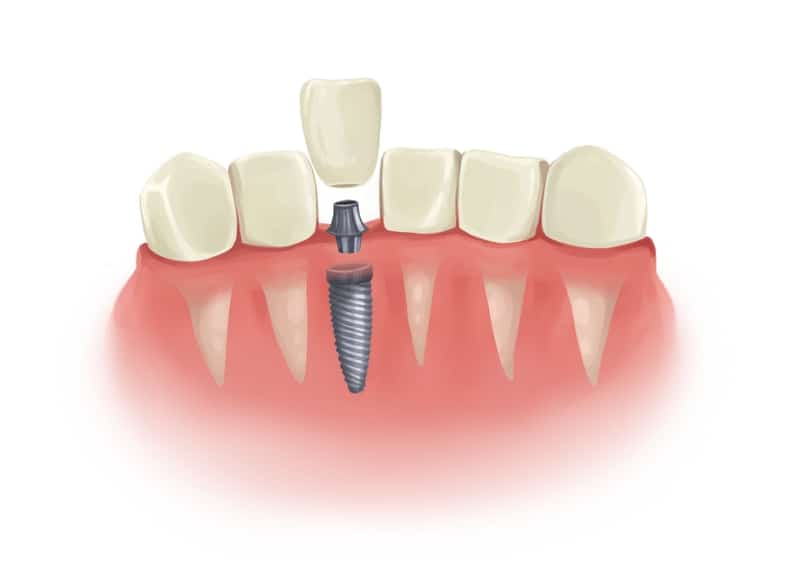How long do dental implants last?
You’re missing one or multiple tooth and your dentist advised you to get implants but you have no idea how long do dental implants last? Discover the answer in this article and learn more about dental implants.
What are dental implants?
A dental implant is made to replace a missing tooth, and gives a result that is the closest you can get to a natural tooth. It is an artificial root to which a ceramic crown can be fixed. Dental implants are in most cases made out of titanium, a material that is perfectly biocompatible with the jawbone and very resistant over the years, but the question remains, for how long do dental implants last ?

How long do dental implants last?
A dental implant is composed of the implant, also called a screw, the abutment and the crown. The screw is the first part that will be put in place, as it bonds directly with the jawbone and the surrounding bone tissue. The screw is intended to be permanent, however the crown may need to be replaced in 15 to 20 years as it can loose strength over years.
What factors can influence dental implants life span?
Oral health has a direct impact on the life of dental implants as it replaces a lost tooth and performs the same functionality as a natural one. When it comes to natural teeth, dental implants need healthy bone and gums or support. A clean mouth is the key for that. Having a good oral hygiene helps prevent the appearance of tooth decay, plaque and gum disease.
Gum disease can cause bone loss in the jaw bone and result in the failure of the implant. Even if gum disease can be easily treated at an early stage, it stays very important to adapt a proper oral hygiene to preserve the lifespan of your dental implants.
Another factor that has a direct impact on the life span of dental implants is smoking, which can affect the healing process of implants. Nicotine in tobacco reduces blood circulation, which is very important in the transport of nutrients to heal tissues and fight against potential infections.
Medical conditions also affect the lifespan of dental implants. Any diseases that affect the body’s ability to heal and fight infections such as a weakened immune system, blood clotting disorders, or diabetes can lead to the failure of the implants.
Alternatives to dental implants
Getting a dental bridge is a great alternative to dental implants. It is a set of interconnected crowns. The bridge is permanently attached to adjacent healthy teeth, which are also known as “abutment teeth”. As dental implants, it serves to replace one or several missing teeth. But unlike dental implants, it doesn’t always require surgery.
There are various types of dental bridge that suit the situation and needs of each patient. The patient can get a single dental bridge or a full dental bridge on implants.
Dental implants aftercare
In order to fully recover from dental implant surgery, the patient must follow the instructions given by his dentist.
| To do | To Avoid |
| – Use ice packs on the surgical area, apply ice 20 minutes on and 10 minutes off. – Keep fingers and tongue away from the surgical area. – Drink plenty of fluids (water, juice…) – Eat soft, easily swallowed foods. | – Do not use a drinking straw. – Do not smoke. – Avoid alcohol. – Avoid physical activity. – Avoid raw and hot food. – Avoid covering your face. |
What can’t you eat with dental implants ?
Foods and drinks to avoid:
- Sticky Foods. Gum, caramel, and chewy candy can potentially damage the dental implant. It is advisable to avoid sticky foods, especially during the first days, when the implant is new and hasn’t completely bonded to the gum.
- Hard foods. Dental implantsare made of strong materials, but they can still be damaged because of hard foods such as nuts. Hard foods can damage the implant’s structure and shorten its lifespan.
- Wine, Coffee, and Cola. Dental implants are made of stain-proof materials, regularly consuming dark drinks such as
coffee, cola, wine can stain the implant. In order to maintain an aesthetic white dental implant, it’s recommended to avoid thise type of drinks.
Q&A:
Can dental implant last forever?
Dental implants do not last forever as they have a lifespan of 15 to 20 years. A good oral hygiene and regular dental examinations help maintain the lifespan of dental implants.
How to pay cheaper for your dental implants?
Dental tourism is one of the best option to pay less for your dental implants. They are way cheaper in Spain than in the UK for example. Spain is very well known for high quality dentistry services. Learn more about dental implants prices here.
What happens if an implant fails?
Many factors such as poor oral hygiene can lead to dental implant failure. Regular visits to the dentist, and good oral hygiene helps to avoid their failure. If the implant fails, it is very important to contact your dentist to get a better understanding of why the implant failed and what can be done to repair it.











